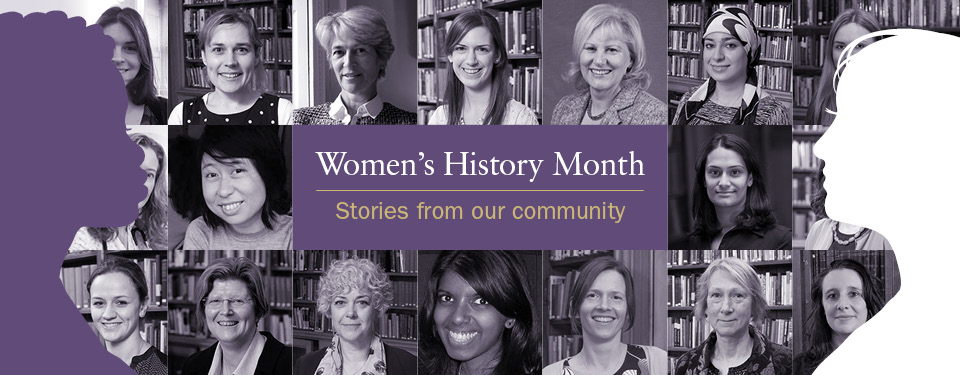
March marks Women's History Month, and our Acting President, Professor Angela Thomas OBE, shares her thoughts on its importance:
I was appointed as the College’s Acting President in May 2020 after being involved in the work of the College for over 30 years. I am proud to be the first female physician in this role and I do hope that it will encourage other women to apply for leadership roles in healthcare and beyond.
I’m also proud of the College’s vibrant and diverse community and, as we continue to grow, it is vital that women have a voice at all levels in healthcare organisations, including leadership roles. I know from experience that often women don’t put themselves forward as frequently for such roles for a variety of reasons but I am committed to ensure that the opportunities are available and that women are able to reach their potential.
From my own experience, I know that having strong women role models can inspire and motivate. I remember as a medical student being taught by a registrar, Professor Dame Parveen Kumar - or Dr Kumar as she was then - and subsequently working for her on the Bart’s Rotation. She used to take the medical team for fish and chips on a Friday and I remember asking her advice about how she balanced her work and family commitments - her advice was wise. The thing that impressed me though was whenever and wherever I met her subsequently, in her increasingly senior roles, she always remembered who I was and asked me with genuine interest how things were going. I learnt much from her inclusive and supportive approach.
Women’s History Month provides an opportunity to reflect upon those women who have influenced the development of our society as we know it today. For example, the contribution of Dr Isabella Pringle (1876–1963), who in 1929 was the first female fellow of the Royal College of Physicians of Edinburgh. Dr Pringle was a clinician with a social conscience and keen eye for how to organise and improve services for patients. More than two decades before the establishment of the NHS, she developed and led one of the most comprehensive maternal and child welfare schemes in the country.
Today, I am delighted that women such as Professors Sarah Gilbert and Catherine Green, two of the leading scientists who developed the Oxford vaccine, will inspire future generations.
But celebrating women for one day or month of the year is not enough. I have seen a lot of change and improvements in my career and across society, but to say inequality no longer exists would be inaccurate and unfair to those who continue to fight for an equal place at the table.
A year on from the COVID-19 outbreak in the UK, there is a genuine concern that the social and economic fallout could have a long-term impact on gender equality, whether because of the health impact, the burden that many women have taken on in terms of home schooling and child care, the economic impact as women and girls around the world are pushed below the poverty line, or the increase in domestic violence during the COVID-19 pandemic. Sadly, the evidence continues to grow highlighting the disproportionate impact on women and we need to redouble our efforts to tackle this.
In my own professional life, I have been treated inappropriately as a woman and even experienced abusive behaviour. I know now that we must call this out and challenge this behaviour to ensure that it is not accepted or tolerated, and to try to prevent it from happening to other women.
Only earlier this month, we have heard of the tragic story of Sarah Everard who was killed while walking home. My heart breaks for her family and friends. Her story has forced so many of us to relive the threatening situations that we have found ourselves in and highlights that events such as being followed or harassed are too frequent a part of women’s lives.
From my own perspective, I am committed to challenging gender bias and inequality for my three daughters, for my friends and colleagues, for those I have taught, and for women everywhere. I ask women and men to do the same whenever they feel able to. We owe this to the next generation of women pursuing careers in healthcare and we must inspire them to stand up and join us.
From the College’s perspective, we recognise that we need to do more to encourage women to become members and progress on to Fellowship to ensure that our membership reflects the wider NHS workforce. This week the Royal College of Surgeons of England published an independent review into the diversity of the leadership of the surgical profession and of their College. The report made uncomfortable reading but it is always right to reflect and review, both on yourself as an individual and on the organisations that we represent. It is important that all Colleges learn lessons from this review – no one is exempt. Our Equality, Diversity and Inclusivity group will play a vital role in this for our College, for women but also for ensuring quality and parity of access, involvement and representation for all. We will report on our gender balance in the make-up of our Council, committees and groups, and ensure we provide the right opportunities to encourage young women to choose a career in medicine and give them the individual support that they need throughout their careers.
We face a big task ahead as we tackle the longer-term problems that COVID-19 has created. But, if COVID has taught us anything, it is that we can change, adapt and do things differently, and we must embrace this to deliver real change for women.